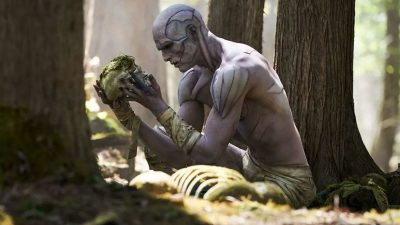I can hardly imagine anything more unsettling than a missing child. But what if that child might never have existed in the first place? Otto Preminger’s 1965 psychological thriller Bunny Lake Is Missing plays on this chilling premise, twisting and turning through a maze of paranoia, gaslighting, and Gothic unease. This is not your standard missing-person procedural—it is a stylish, eerie, cool and at times darkly humorous film that keeps you guessing until the very end.
At the center of the story is Ann Lake (Carol Lynley), a woman newly arrived in London with her young daughter nicknamed: Bunny. When Bunny mysteriously vanishes on her first day at The Little People’s Garden School (great name!), Ann is thrown into a desperate search for her child. But as the hours pass and no one recalls ever seeing Bunny, the question shifts from where she is to if she ever existed at all. Ann’s brother, Steven (Keir Dullea), a journalist, initially supports her but soon starts behaving suspiciously too. The case is taken up by Superintendent Newhouse (Laurence Olivier, in a wonderfully relaxed and naturalistic performance), who must determine whether Bunny is truly missing—or if Ann’s mind is playing tricks on her.
The film is based on Merriam Modell’s novel (pen name: Evelyn Piper) of the same title though its journey to the screen was anything but smooth. Otto Preminger was notoriously difficult to satisfy, rejecting several script drafts before settling on one by the then married couple, John and Penelope Mortimer. The adaptation took significant liberties with the source material, shifting the setting to London and altering key plot points, including the ending. The result is a film that stands on its own, retaining the novel’s psychological tension while making full use of its new setting.

Source: The New Yorker
And what a setting it is! Ann and Steven initially stay in a grand villa just outside London—an actual property once owned by Daphne du Maurier’s father, which is a fun connection given Bunny Lake Is Missing’s Gothic undertones. But it is the pre-school that truly steals the first-half of “the show”. The building, with its claustrophobic corridors, hidden rooms, and shadowy staircases, feels like something plucked from a childhood fever dream. The institution’s eccentric headmistress, played with creepy charm (is that even a thing?) by Martita Hunt, still lives upstairs, recording children’s voices for a bizarre book she’s writing on nightmares (what the heck?).
Preminger, known for his long takes and meticulously composed shots, delivers a visually striking film. Cinematographer Denys Coop (Superman) bathes London in a soft, elegant black and white, creating an atmosphere that is both dreamy and ominous. The film’s cinematography places it among a wave of beautifully shot, pulsating 1960s British thrillers—think Joseph Losey’s The Servant or early Polanski. There’s no expressionistic harshness here; instead, shadows creep in gently, slowly tightening around the characters like a noose.
The film’s eerie tone is heightened by versatile composer Paul Glass’s score, which plays against audience expectations. At times, the music is playful, almost whimsical—a stark contrast to the escalating tension of the plot. This juxtaposition mirrors the film’s setting: a school, a place associated with innocence, becomes the stage for a psychological thriller where everyone is a suspect. The use of The Zombies song (Just Out of Reach) showcases moments of rock ‘n’ roll level in filmmaking too. The lyrics feeding into the plot, the genre and rhythm going against the movie’s own, both the pub and the hospital scene – where the song gets featured – are nothing short of brilliant.
Of course, no discussion of Bunny Lake Is Missing would be complete without addressing “the giant” in the room: Preminger himself. A famously difficult director, he had a reputation for screaming at actors and ruling his sets often led by his temperamental nature. Laurence Olivier, a composed veteran of stage and screen, had such little patience for Preminger’s outbursts that his contract included a clause allowing him to walk off set if the director started yelling. (Ironically, Preminger largely behaved himself during filming—perhaps fearing Olivier would actually take him up on the offer.) The anecdotes do not stop there. Olivier’s wife, the late great Joan Plowright, reportedly used Preminger’s name as a threat during marital spats, warning that she would invite the director over for dinner if Olivier did not behave. A power move, if there ever was one.
Beyond its production history, Bunny Lake Is Missing is fascinating for its bold approach to taboo subjects. In one of the film’s most surprising moments, abortion is discussed openly—something that was not only practically unheard of in 1960s cinema, but factually labelled as taboo. When Superintendent Newhouse questions Ann, she candidly reveals that both Steven and Bunny’s father tried to pressure her into terminating the pregnancy. It is a stark, matter-of-fact moment that underscores the film’s progressive streak, setting it apart from many of its contemporaries.
I cannot help but mention: Noël Coward, who delivers a delightfully unsettling turn as the flamboyant yet sinister landlord, Horatio Wilson. Though widely known as a playwright, screenwriter, and all-around polymath of his era, this was one of the rare times one of „the funding fathers of English culture” showcased his acting talents on screen. With a mix of playfulness and quiet menace, he turns Wilson into a character both absurd, funny and genuinely creepy—an aging dandy with a fondness for alcohol, inappropriate intrusions, and, as hinted in a now-lost scene, openly gay. In a memorable scene, we get to see his collection of whips that he proudly flaunts to the police. Clutching his tiny Chihuahua like a hostage in a sack-like coat, Coward’s Wilson spices up Preminger’s psychological puzzle.

Source: Film Forum
Despite its many strengths, Bunny Lake Is Missing is not without its flaws. There are moments that definitely lean into old-school melodrama and showcases overacting to the moon and back, especially by the leading duo. Both Lynley and Dullea give quite untruthful performances, to the point where those often feel caricaturistic. God knows what Stanley Kubrick saw in the young American actor. Reportedly, he immediately cast him as the lead in 2001: A Space Odyssey after seeing Preminger’s movie.
Another weak point: the film’s final act becomes somewhat redundant and too lengthy. The tension built so carefully over the first two-thirds gives way to a somewhat convoluted resolution. That said, even when the plot runs in circles, the film remains mesmerizing—largely thanks to its atmosphere and elegance.
Though Bunny Lake Is Missing was not a massive hit upon release, it has since earned a fanbase. Its mix of Hitchcockian suspense, Gothic dread, and 1960s London cool makes it a film well worth revisiting. In an era where gaslighting is a term we now hear almost daily – and experience it especially if we dare to turn on the news – the film’s themes feel oddly prescient. What happens when a woman insists on a truth that no one else believes? How quickly can society turn against someone who refuses to back down? These questions resonate just as strongly today as they did nearly sixty years ago.
So, is Bunny real? That is for you to find out. And while you watch, maybe grab a bowl of old-school nursery junket — after all, Superintendent Newhouse would approve.
You can now catch Bunny Lake Is Missing on Apple TV or FuboTV.
~ by Dora Endre ~
























